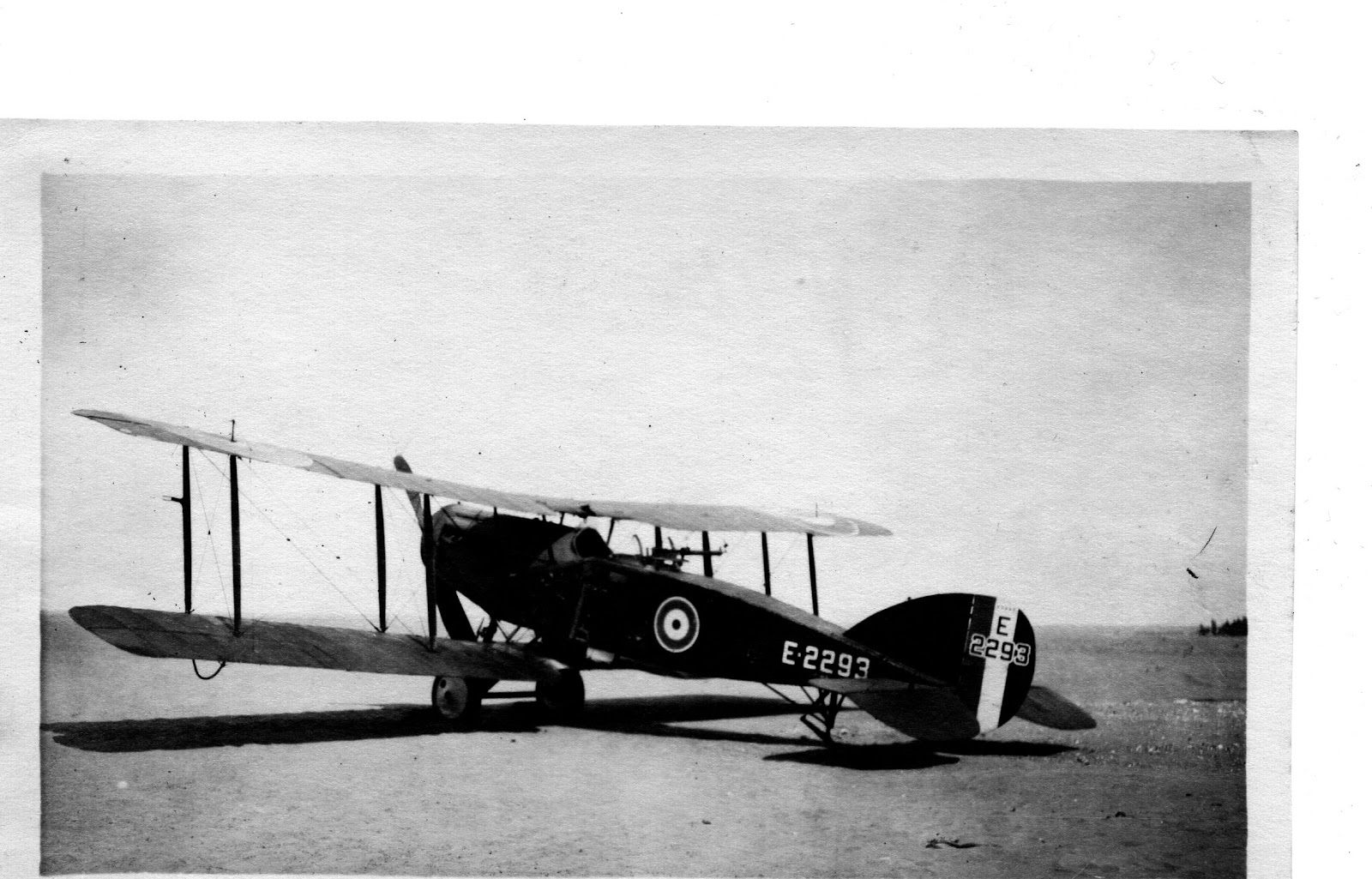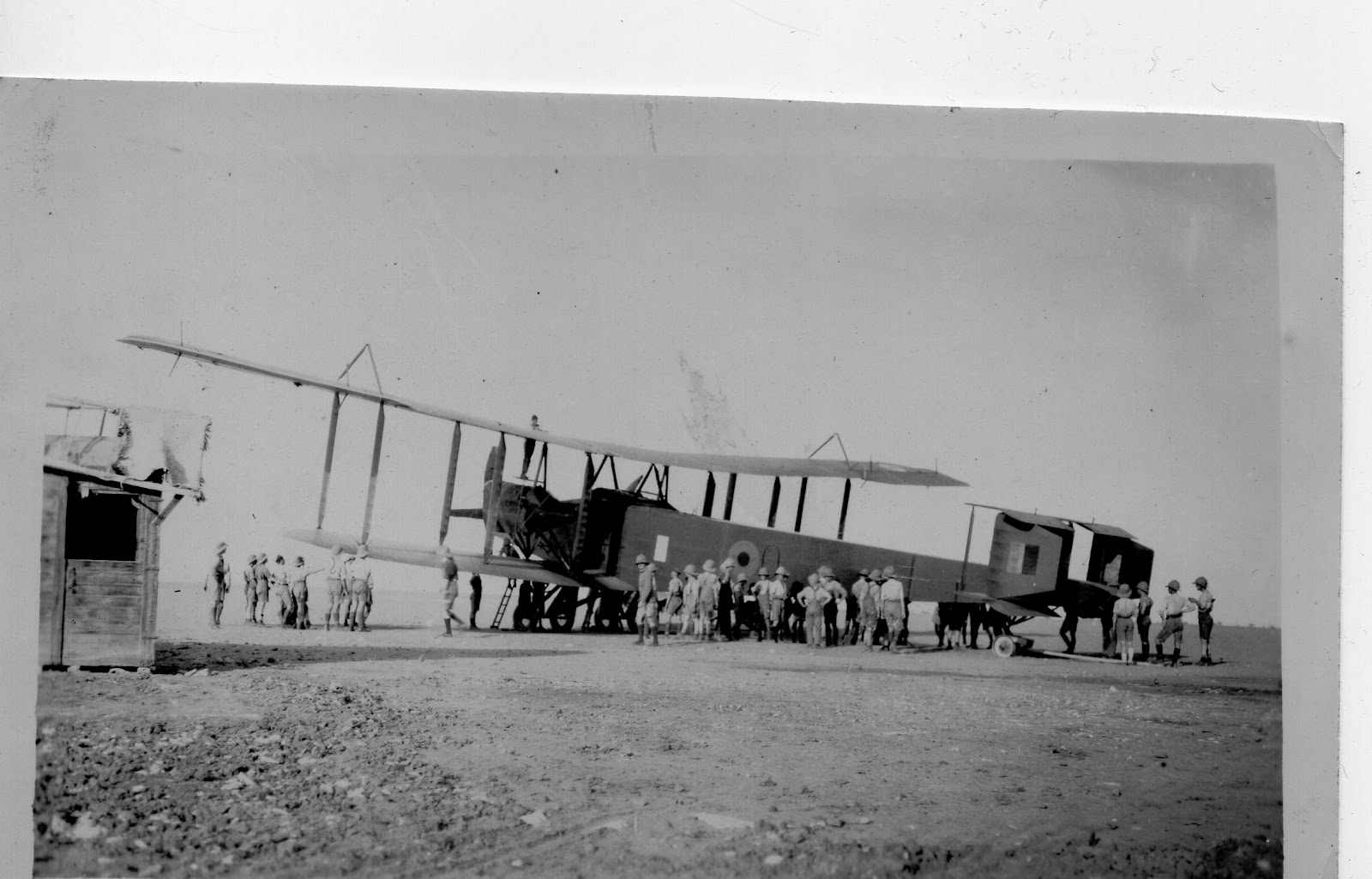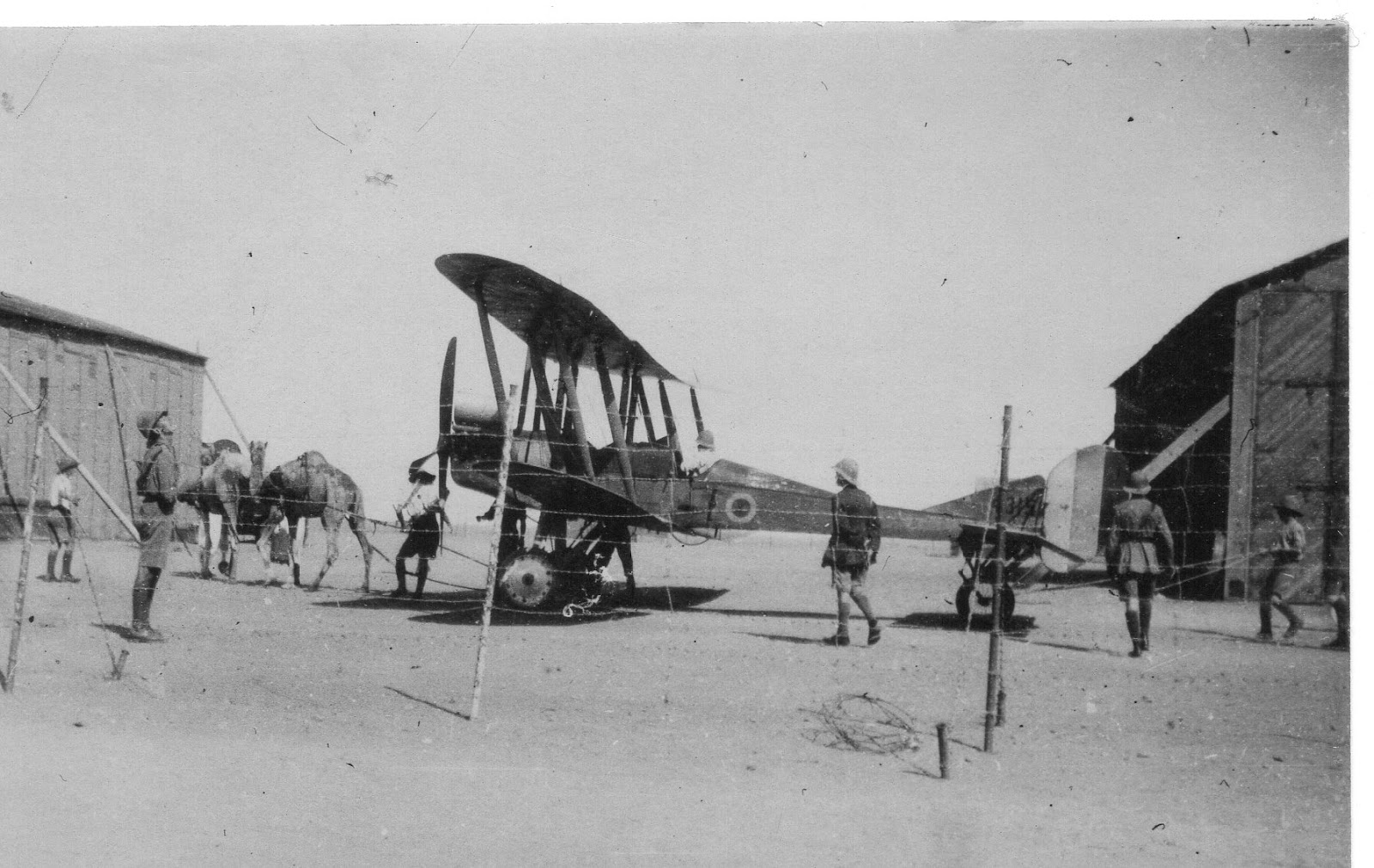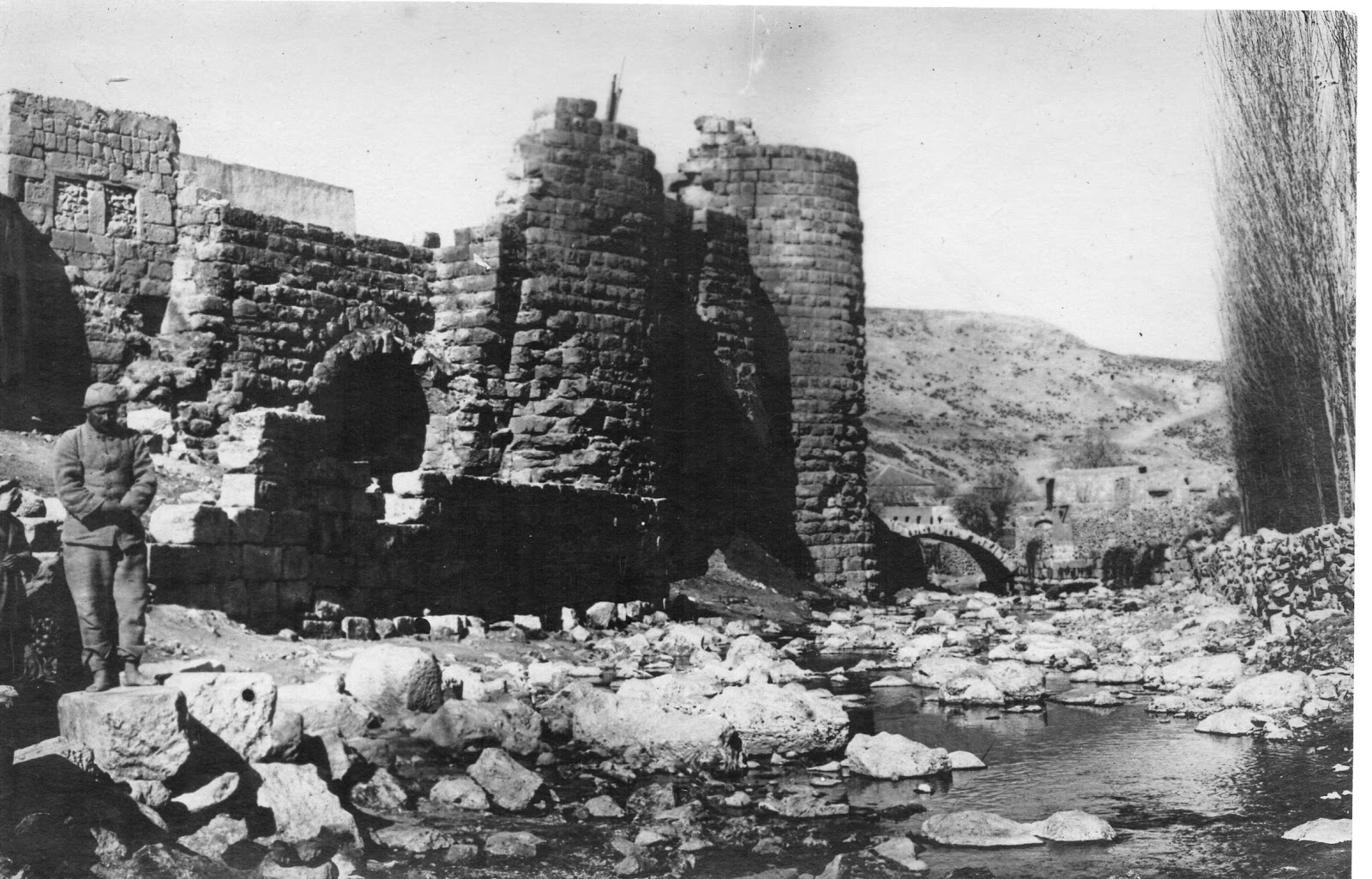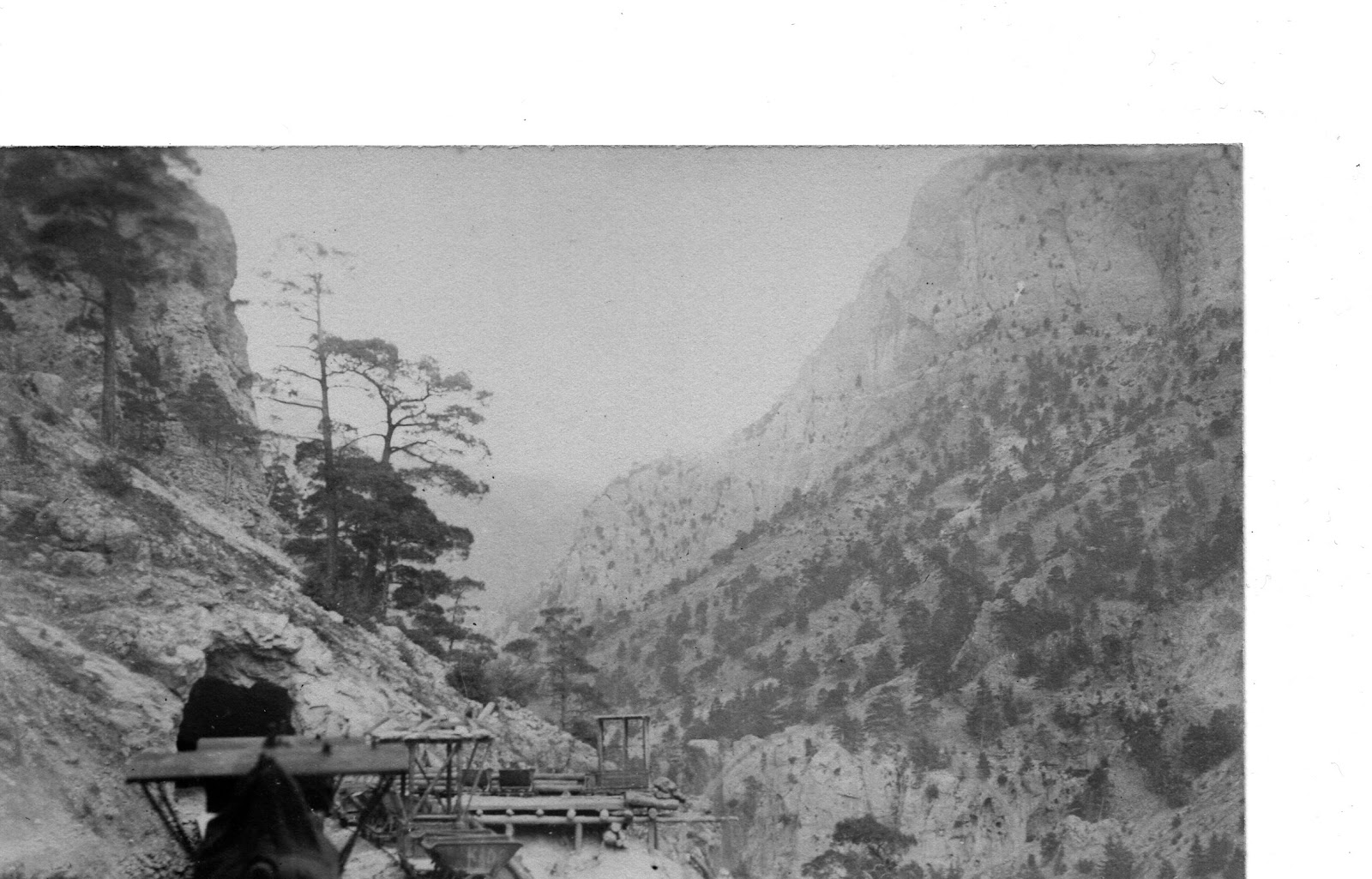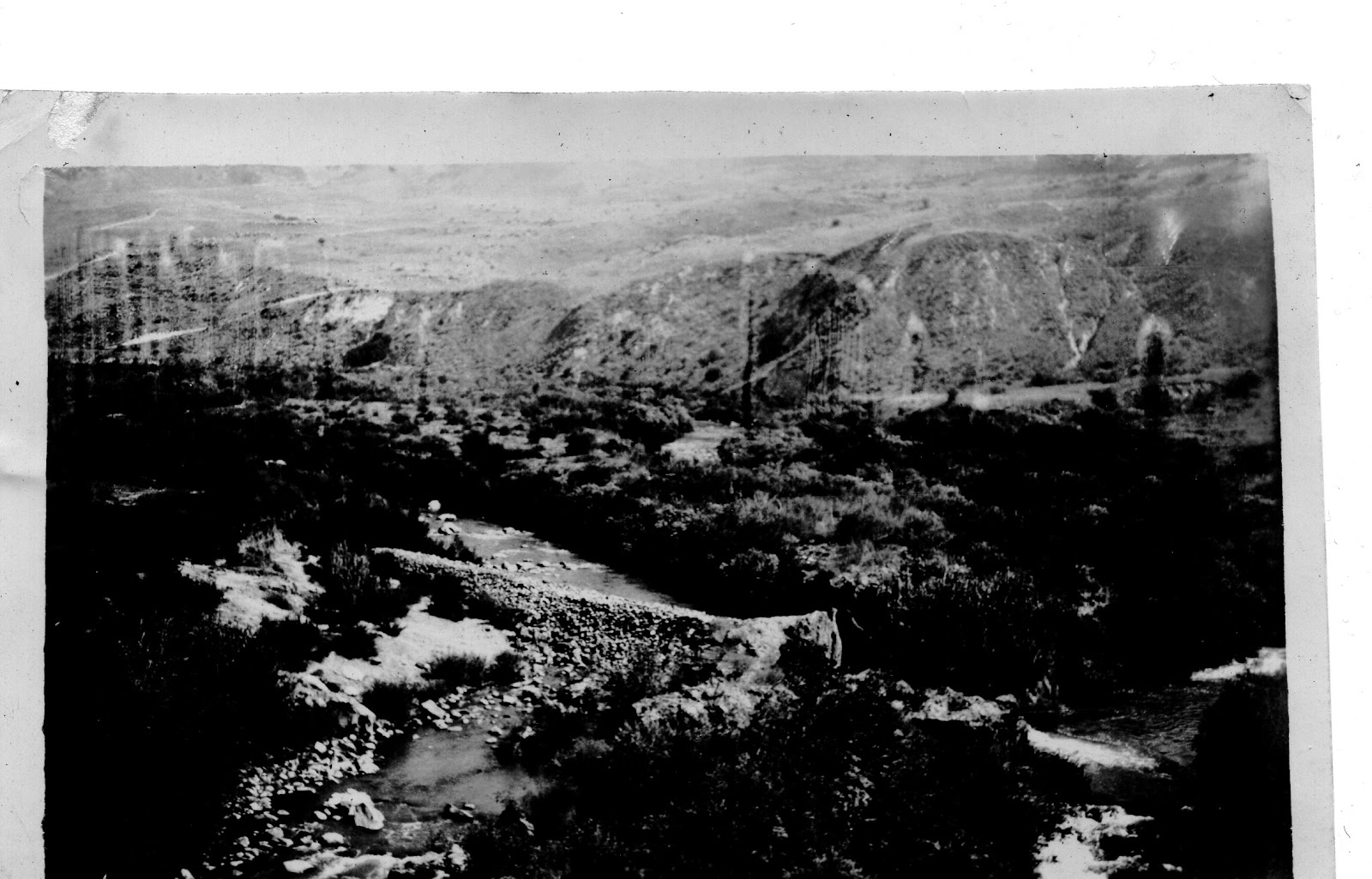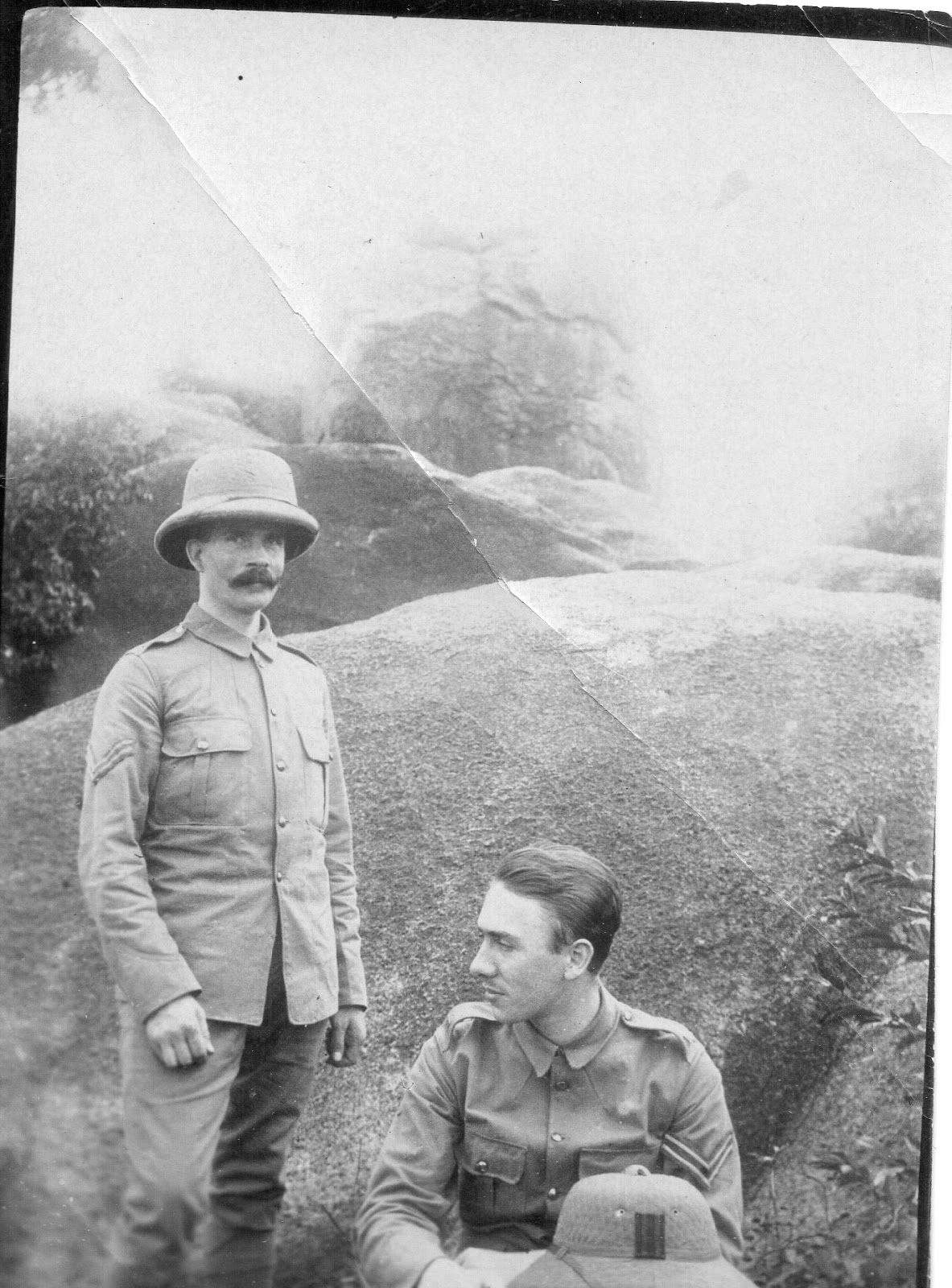This is the tail end of May 1916, to almost the end of July, and includes references to some events the papers called The Katia "Bickerings".
Saturday the 29th
Bathed in the Canal. Quite a treat. Water so buoyant you can't sink.
Sunday the 30th
Service at YMCA.
Monday May 1
Inoculated again against cholera. P???, best I have had.
Wednesday May 3
Photographic reconnaissance on El Arish - the Turkish Aircraft Base. Mr Bill[?] our best pilot did not return. The 2nd machine's alright. He was last seen dodging "archies". Search was made but nothing resulted. We all miss him. He was as keen airman as he was for a pilot.
I guess "archies" are anti-aircraft guns.
Thursday the 4th
Orderly Cyclist taking leave for inve??ation. Am taking his place. Bicycle in rotten condition. PVM [preventative vehicle maintentance?] very poor out here. Too heavy and skids too easily. Very difficulty to hold if in the loose sand which abounds here.
Friday the 5th
Walked over to the Canal for a bathe.
May 31
The rest of the month has passed in a more or less quiet way. There have been alarms for Hostile Aircraft. On one occasion they bombed Port Said by moonlight. On another a heavy bomb killed seven men at Romani and hurt several others. Their machines - mostly Aviatiks - are faster than our. I remember the look of disquiet on Capt Grant Dalton's face at the end of one air raid. He had exchanged shots with one when the pilot turned around, waved farewell and left him. Now we have two de Havilland fighters, large and fast machines, they should give a good account of themselves.
Early in the month Mercer the clerk went sick. I took his place as clerk. Things were rather behind hand. ?/Sgt May does not do much in the office and therefore it devolves on Mercer to do the work. However I got it straight and had the satisfaction of seeing myself recommended for promotion.
By the way out here promotion is awful. It is practically impossible. It is a pity because it causes much discontent.
The Turkish aeroplanes he mentions are likely Aviatik B.I. The de Havilland may be the Airco DH.1 - the Wiki page says:
"The DH.1 saw operational service only in the Middle East theatre, where six Beardmore-powered DH.1As arrived in July 1916. These were used by No. 14 Squadron RFC as escorts for their B.E.2 reconnaissance aircraft.[6] An Aviatik two-seater was claimed by a 14 Squadron D.H.1A on 2 August 1916 for the only known victory of the type. The last known action by a DH.1 was on 5 March 1917, when one was shot down during a bombing raid on Tel el Sheria.[7] No. 14 Squadron became an R.E.8 unit in November 1917; it seems probable that the last operational DH.1 had gone before that date."
The date is a month out, but it is the right squadron.
June 1-9
Have bathing parades every morning in the Canal at 0545 time.
June 9
After tea was ordered to Ismaili again. Returned to find new lens to be installed. The place was altered somewhat as huts are being put up for all.
My room ??? awful mess. Took two days to settle down.
June 11
Am to instruct Lukerman[?] Black Box work. Why?
June 13
Rumours of my going in the office.
June 15
Handed in my pre war qualifications. What for?
June 18
Yesterday 4 machines went to Kantara to participate in a raid on the Turk aerodrome at El Arish. 11 machines went.
Raid a failure. Capt Tipton was brought down there with his machine on fire. We are more sorry than we can express. He was a good pilot and a fine man. On a previous raid his petrol pipe was smashed. He went down and repaired it in the enemy lines and came on again. Lt Minter with Lt Paris as observer were brought down too.
Capt Grant Dalton immediately came down and picked both of them up. They were able to burn their machine.
Another bus[?] came down in the sea. Apparently two or at most three of the enemy machines were destroyed. The hangers were undamaged. G.D. certainly deserves the V.C. I wonder will he get it? Or only the Military Cross.
There is a newspaper cutting stuck in at this point which relates the same event.
British Pilot's Swoop to Save Comrade
Two Turkish Air Sheds Destroyed and Four Hit Many Times
(British Official)
Press bureau, 6.15 p.m. - The secretary of the War Office makes the following announcement:-
the following report has been received from the General Office commanding-in-Chie in Egypt:-
A most successful raid was carried out on June 19 by the Royal Flying Corp against a large enemy aerodrome about five miles south of El Arish and 100 miles from our nearest aerodrome.
The aerodrome, which consisted of ten large hangers, was located on June 13, and a strong raid was immediately planned, in which eleven machines took part.
he first machine to arrive discovered an enemy plane on the ground, apparently about to fly, as the pilot and observer were in their places and several mechanics at hand. Our pilot descended at once to a height of 100ft, and destroyed te plane, observer and mechanics. Another enemy planer found on the ground was also destroyed.
At Height of 600 Feet
Of the ten hanger two were set on fire and completely destroyed, while four were hit many times with bombs. It is presumed that these hangers contained aeroplanes, and in all probability at least five, and possibly more, were put out of action.
Our machines delivered their attack from a height of 600ft, but in spite of being under very heavy rifle, machine gun and anti-aircraft gun fire, they continues their attack until all bombs, seventy-six in number, were expended.
In addition to the aerodrome, enemy camps and troops were assailed, both with bombs and machine gun fire.
We lost three machines in the course of the operations. Of these, one was forced to descend about two miles north of the aerodrome: the pilot, however, finding that escape was hopeless, set the machine on fire to prevent the enemy from capturing it.
Fell in the Sea
The second fell in the sea, the pilot being rescued by motor-boat.
The third was compelled to land eight miles west of El Arish: the pilot endeavoured to carry our repairs and while doing so was seen by one of our escorting machines, which at once landed, at considerable risk, picked him up and flew back a distance of ninety miles to Quantara, carrying two passengers in addition to the pilot - an extremely gallant feat.
I cannot speak too highly of the manner in which this attack was carried out.
The diary continues with a third version of events.
June 20
Later version. Turks knew of arrival. Greeted pilots with perfect hail of bullets from machine guns and "Archies". Capt Tiltop shot down. Volplaned on aerodrome and got out. Machine on fire. ??? machine on ground ready to ascend Lt MacVarem dived to 100 ft and dropped 20 lb bomb plumb on it. Expect Military Cross. Lt Minter dropped in sea. Rescued by patrol motor boat. Enemy plane bombed it. Motor broke down. Some time before boat rescued them. Capt Grant Dalton with Lt Paris for observer. At Lt P suggestion came back by coast route to see if anyone else in difficulties.
Saw Lt Van Robelt(?) on ground with machine all smashed. Planed down. Burnt it. Scrapped Lewis guns, ammunition, rifles, etc. to reduce weight and then took him home.
I guess volplaned - or whatever the word is - means to make an emergency landing.
June 21
SM came over this morning and sent me into the Office. I am not remarkably keen on it. I shall move my kit over to clerks tent. They really don't seem to know what to do with me. It is a rotten mess up.
The next two entries very faint, so even more likely to be wrong!
July 2
Up till now have been pottering round the office. Since they are overstaffed it is difficult to find something to do. Tried for a weekend pass to Cairo but could not get it. Got down to Church tonight.
July 4
Am about to do a bit of chemistry for the photographer. Went down town in the sidecar last night to obtain necessaries.
Is that a motorbike sidecar? It gets a mention later, and I am reasonably certain that is the word.
Wednesday July 5
The chemistry has not gone over well. There is nothing to work with. Still it should come out all right.
Went down with the mail this morning and had a little joy ride round. Ismailia is so very pretty on the lake side. All the way to Ferry Post it is lovely. Ferry Post itself - the main point of the Turkish attack - is about 100 ft up. You look down the yellow sand hills and see the entrance of the Canal into the lakeland out before you. Returning, we skirted the town and went past the camel corps - a desert ride pure and simple. Quite a contrast.
Thursday the 6th
Had a flight this morning with Capt Grant Dalton. I was in bed when he called me, but dressed in record time. Once in the machine you are alright. You seem to get up a terrific speed whilst on the ground. I never knew just when we left it, and was a bit surprised to look out and see the machine supported on nothing - apparently.
The feeling soon passed and gave way to quite a pleasant sensation as the 'bus rushed thro' the air. It was quite a decent day for a trip. As the machine was put to it to rise at was like a very fast lift. Then we levelled up. It is a bit sickly when you get in an air pocket. The machine promptly drops any number of feet. Turning too the machine doesn't half bank and keel over. We went round the aerodrome then ?? the town and Lake Timsah. It was great.
Not sure about the word "bus", but he uses it elsewhere; could be the fuselage?
Sunday the 16th
For the first time since I came here, I had an afternoon pass. We were lucky in getting a tinder down. Occasionally I had seen the farther end as we passed it in ??? sidecar, but had never had a chance to see it properly. It is just heavenly after our desert. Beneath the trees too it is quite cool even in the middle of the day. At the further end of town on the left of the Ferry Port road, is a small park or gardens. In it are some antique Egyptian statues. I got photos of some. Leaving that place we went over to the Church army hut taking the church en route. The little tea room is really wonderful.
Just after tea I got a picture of the swing bridge over the sweet water canal and then one of some of the Turkish pontoons that were captured in the original Turkish attack. It made a pleasant afternoon but really there is not enough in the town to fill half a day.
"Tinder" is another word I am unsure of. I thought it might be "tender", but it is used several times, and definitely not that.
July 20
Reco Reports show that a large number of Turks are coming along the Northern Route. The number of Hostile Aircraft alarms is really alarming - and they are all washouts.
It is quite amusing to see the men doubling about. There comes a ring on the phone - Hostile Aircraft seen at ___ proceeding ___ time ___. You start for the CO with the news and the Wireless Telephone speaks up. Before that's finished our wireless ring a rather buzz up. Or after another the three messages are run into the CO. Perhaps if you're lucky there is nothing done, Generally though it is "sound the alarm". This alarm is a weird contrivance hung outside the Orderly Room. It consists of two pieces of iron pipe - of different length hanging from nails on one of the projections from the roof. You seize a half crowbar and proceed to bash these about. Sometimes you hit one. Normally you miss both. Anyhow in the camp just a small tinkle is heard. But it is enough. Men double out in all directions. Some make for the machines, others for the machine guns. In a moment from the far end of the sheds comes half a dozen men trolling round with a Bristol Roant.[?] One man hangs on the prop. Another follows behind with a syringe and petrol can.
They are hardly out before a BE fairly shoots out of the first shed. One man is joyriding on its prop two more are pushing at the wingtips. Four more hold the tail. To the right three men are running a Lewis gun across the desert to its mounting near the reeds. Three or four more are clambering out the roof of the sheds to the lookout first with another. A buzz from the Tarmac betokens the Scout engine starting up. There is no running it in P[warming up the engine I guess]. Off it goes straight up and climbs in a spiral over the sheds with astonishing speed, for the Major is a fine pilot. Meantime the BB is also ready and would set off the moment the hostile machine was sighted.
A few days ago we had a de Havilland too. They would run that then about four or five men would fall in and follow behind to pick up the broken pieces, then they would come back and look for more. It was simply killing to watch.
By this time the hostile machine has done its raid and returned so the T is part out the machines come in and all settles down to quietude once more.
A very brief newspaper cutting.
Situation At Katia
Press Bureau
The situation in the Katia area remained pracxtically unchanged on the 26th July. Or advanced cavalry drove in part of the enemy's covering troops, inflicting some casualties on the enemy, but suffering nine themselves.
And a rather longer one.
The Katia "Bickerings"
A peculiar and somewhat unexpected interest has suddenly been aroused with regard to the operations behind the Canal. Following a period of comparative silence, we received a series of official communiques that go to she that, if there is not exactly heavy fighting in the Katia district, there have been, at any rate, a series of "bickerings" "or the most part," we were informed on Sunday last, "there has been no fighting but constant bickering throughout the day." This implies that the British troops are carrying out certainb movements, to which, if the enemy so wished, they might offer some resisteance, thus bringing about a regulasr engagement.
These movements on our part, it would appear, are being effected for the purpose of obseration., and as might be expected involve the use of a comparatively small number of patrols. In the execution of such fuctions, these forces have inevitably come into contasct with the Turkish outposts, who, lacking the support that the staff are either unwilling or unable to give, have allowed themselves to be pushed back with a minmum of resistance. Such cntact, merely aggrerssive from our piint of view as far as observation movements demand and half-heated defensive from the enemy's standpoint, resultsd not in general fighting, but in a series of small engagements aptly termed "bickerings." That this sporadic warefare is, however, going very much in our favour, is sufficiently clear. Although military observation is the primary factor in our movements, we have "by means of skilful movements, succeeded in capturing many prisoners." Prisoners continue to come in, while our own losses are insignficant.
the position of Katia itself is one of considerable importance. It lies on the northern road across the desert from El Arish to Kantara, and it is normally still more important, being on the main line of teleraphic communication, and havinh one of the five important wells on the northern route. Situated as it is, within thirty-five miles of Kantara, it was a point of considerable strategic importance during thye Turkish advance of 1915. This position is now in the hands of our cavalry and it is obvious the enemy do not underrate its importance, sseing that they have gonew to the trouble of fabricating stories of victory at this point. Possibly they are soothing the public mind in advance of events that cast an unpleasant shadow before them. The British communiques lay claim to no more than a series of successful observation movements. But observation, aerial or otherwise, and not made for nothing. They are important events. And it would not be surprising if the German claims to victory are made with an eye to future happenings more difficult to explaon away.
One final entry for now...
July 25
There was no end of a wind up yesterday. Kantara phoned through that a hostile machine was joyriding above the aerodrome. Up went our Bristol. Then they discovered that it was only a skylark.








